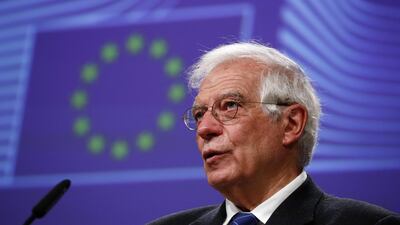As Europe scrambles in response to the coronavirus outbreak, the EU has identified tackling the spread of malign disinformation about the disease as one of its main priorities.
The EU’s foreign policy head Josep Borrell has called the wave of fake news being spread about the coronavirus an“infodemic”. Following a meeting of EU defence ministers he said combating the tide of disinformation was key for member states.
“In the current situation – as I said several times – we are also facing a kind of an ‘infodemic’.” Mr Borrell said.
“It is a toxic process that brings to the public a lot of fake news and wrong information. It is important to remind that Europeans stand together to fight against the crisis,” the EU’s foreign policy chief added.
The EU is in the process of considering a taskforce to coordinate its members states’ military responses to the Covid-19 crisis, led by the European Union military and in lockstep with Nato.
Among the efforts already ongoing at the military level to combat disinformation in Europe are those in Lithuania where the Strategic Communication Department of the Lithuanian Armed Forces started conducting analysis of disinformation attacks related to coronavirus.
The speed at which false information can spread online during the pandemic was laid bare late on Monday when the British government had to deny reports in the Russian media claiming Prime Minster Boris Johnson was on a ventilator in hospital. Although Britain has left the EU, Brussels has already identified Russia as one of the main sources of coronavirus misinformation.
Russian reports about Mr Johnson appeared as the British prime minister was admitted to a London hospital for coronavirus treatment.
"Our specialist government units have seen a rise in false reports since the coronavirus outbreak started. It's vital that any information is knocked down quickly," a 10 Downing Street spokesman said dismissing the report as disinformation.
The UK government, he added would "continue to work closely with social media companies to stop the spread of false information and rumours”.
The Russian false information was published long before the officially sourced reports that Mr Johnson had been taken into intensive care in hospital and had received oxygen through a respirator.
The following morning, Twitter was awash with tweets from fake news accounts claiming the British prime minister, the first head of state or government to suffer from the virus, had died.
MEPs, particularly many from the Baltic states, have written an open letter to EU leaders explaining their concern over Russian disinformation during the crisis.
“We are very concerned, that the spread of erroneous and unfounded criticism towards the EU is actively promoted by the Kremlin,” the letter read.
The letter also highlighted incidents such as recent aid outreach by Russia to Italy. Much of the materiel sent to Italy as assistance by the Kremlin but later proven to be of little practical use.
“By sending humanitarian aid of dubious quality and expedience to suffering EU member states, the Kremlin only serves its own propaganda purposes,” the letter from the EU members stated.
A March report by the EU claimed Russian media had launched a “significant disinformation campaign” against the West to worsen the impact of the coronavirus.
“The coronavirus is a relentless and daily topic in pro-Kremlin media, including state-owned outlets,” the report said.
The EU said that among the rumours being spread by pro-Kremlin and Russian state media were theories that Europeans were in quarantine but migrants could move freely.
It said others included that the EU could impose mass vaccinations and that the coronavirus was a hoax and did not exist.















